CAEP Accountability Measures
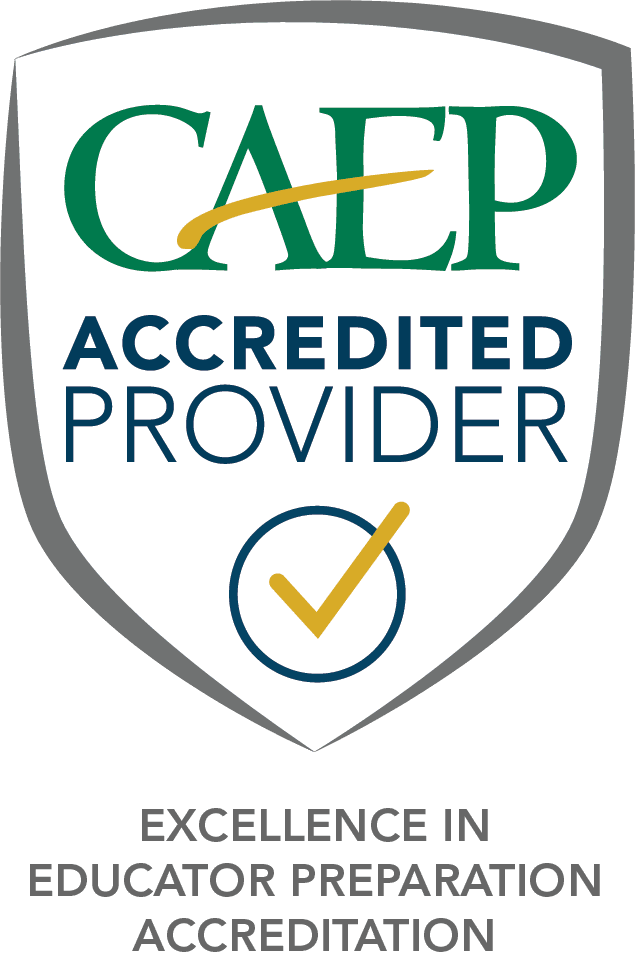
The University of North Carolina at Charlotte was reviewed by the Council for Accreditation of Educator Preparation (CAEP) in fall 2020. Full accreditation status was awarded to all College of Education programs, with no Areas of Improvement or Stipulations noted. Our next accreditation visit will be in fall 2027. CAEP (Council for the Accreditation of Educator Preparation) has four measures, which are used to provide information on program outcome and program impact. Below are the four reporting measures by initial and advanced programs with data tables that provide supporting evidence for each measure:
UNC Charlotte Cato College of Education is nationally accredited by CAEP for 39 of its programs including initial and advanced. Our programs are approved by the NC Department of Instruction. The links below provide tables of the programs currently accredited.
The data tables in this section show the enrollment trends for the past three fall semesters for the initial and advanced programs at UNC Charlotte Cato College of Education. The data includes only CAEP-accredited programs.
Source: UNC Charlotte Institutional Research Census Data Files
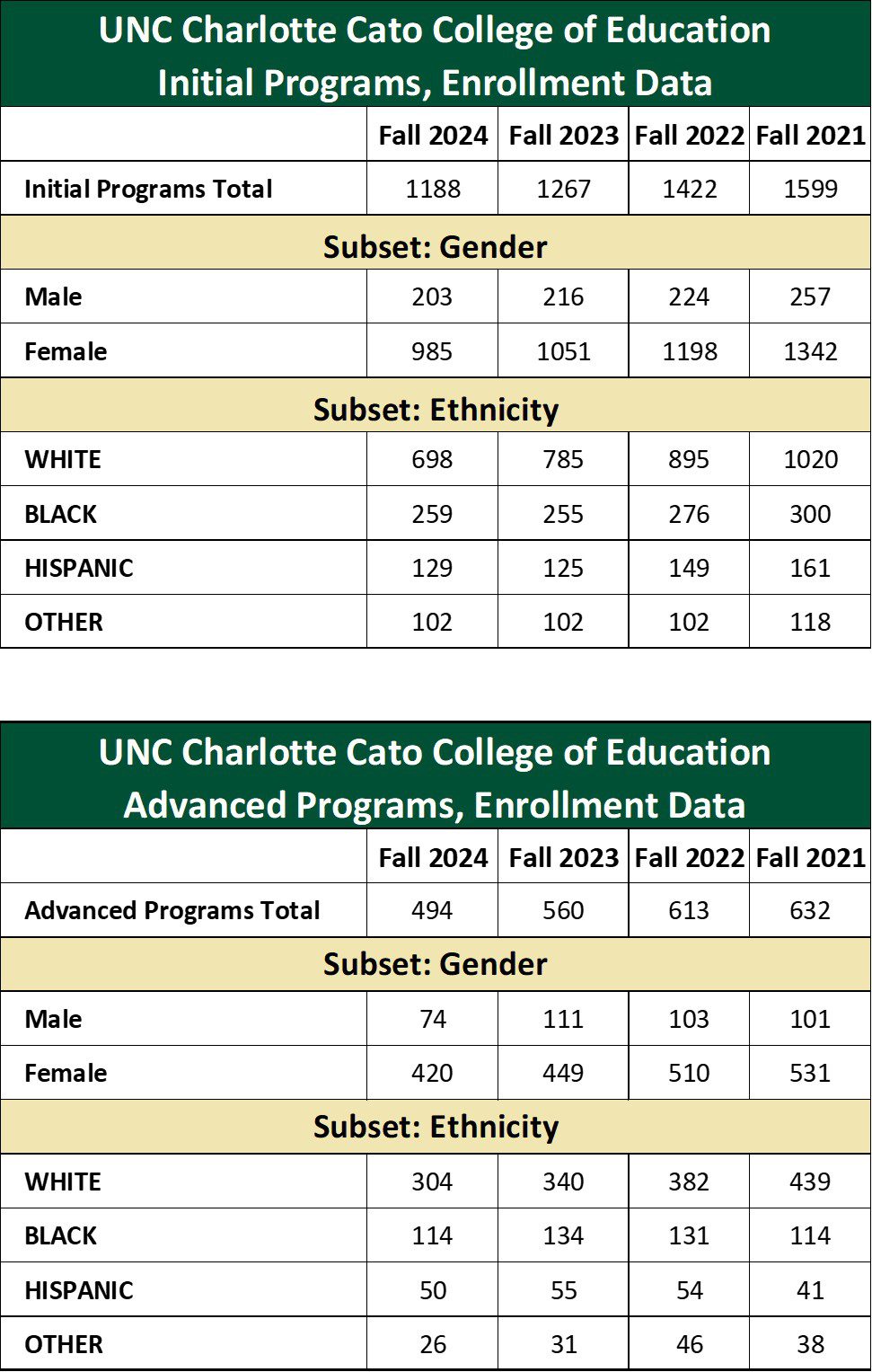
This section includes a summary of data collected through the NC Department of Instruction. North Carolina defines a beginning teacher as one who is in the first three years of teaching and holds an Initial Professional Educator License. A teacher’s rating is determined by a student growth value as calculated by the statewide growth model for educator effectiveness. The percent of graduates from the EPP in their first three years of teaching who achieve a growth rating of ‘meets expected growth’ or ‘exceeds expected growth’ as measured by the North Carolina Education Value-Added Assessment System (EVAAS). Teachers’ composite EVAAS scores shall be used in the calculation of an EPP’s growth measure. EVAAS uses test scores from a variety of assessments and follows individual students over time to provide reflective value-added reports to assess the effectiveness of districts, schools and teachers.
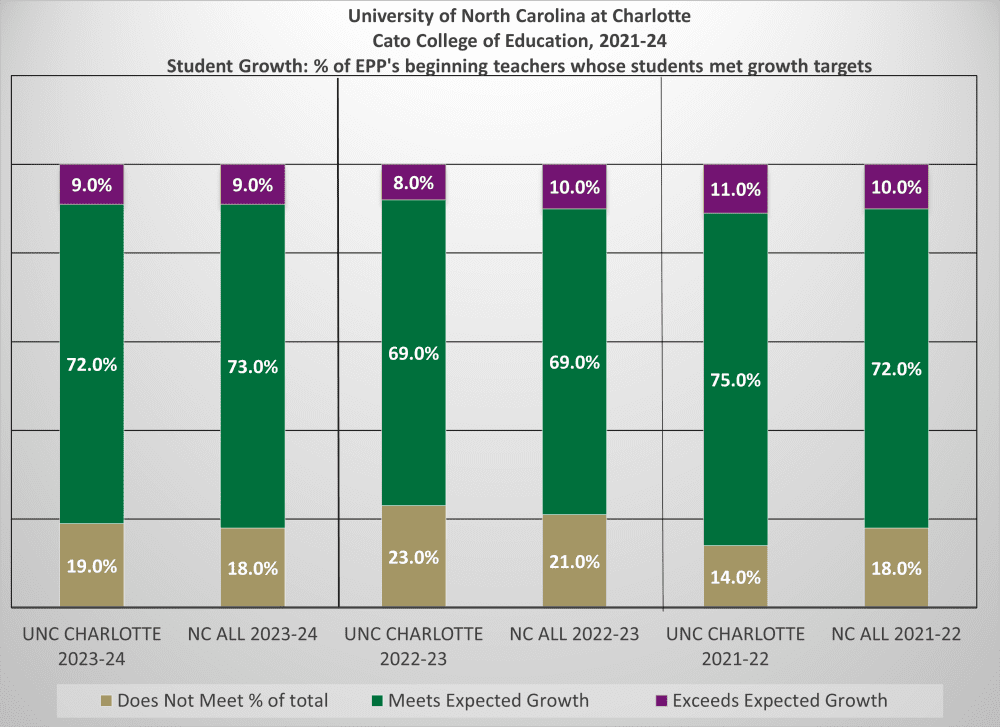
Source: NC DPI EPP Dashboard
This section includes a summary of data collected through the North Carolina Educator Evaluation System (NCEES) for beginning teachers prepared by UNC Charlotte. The evaluation standards identify the knowledge, skills, and dispositions expected of teachers. School administrators rate the level at which teachers meet standards 1-5 as they move from ratings of “developing” to “distinguished.” Effective 2010–2011, at the end of their third year, beginning teachers must be rated “proficient” on standards 1-5 on the most recent Teacher Summary Rating Form to be eligible for a Continuing Professional Educator License.
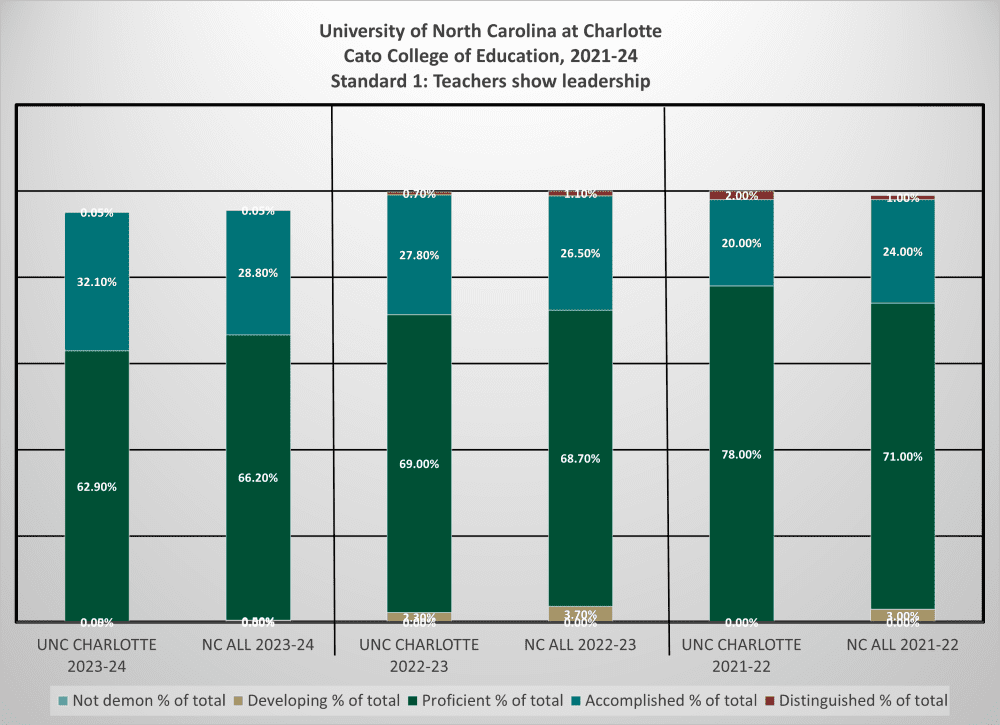
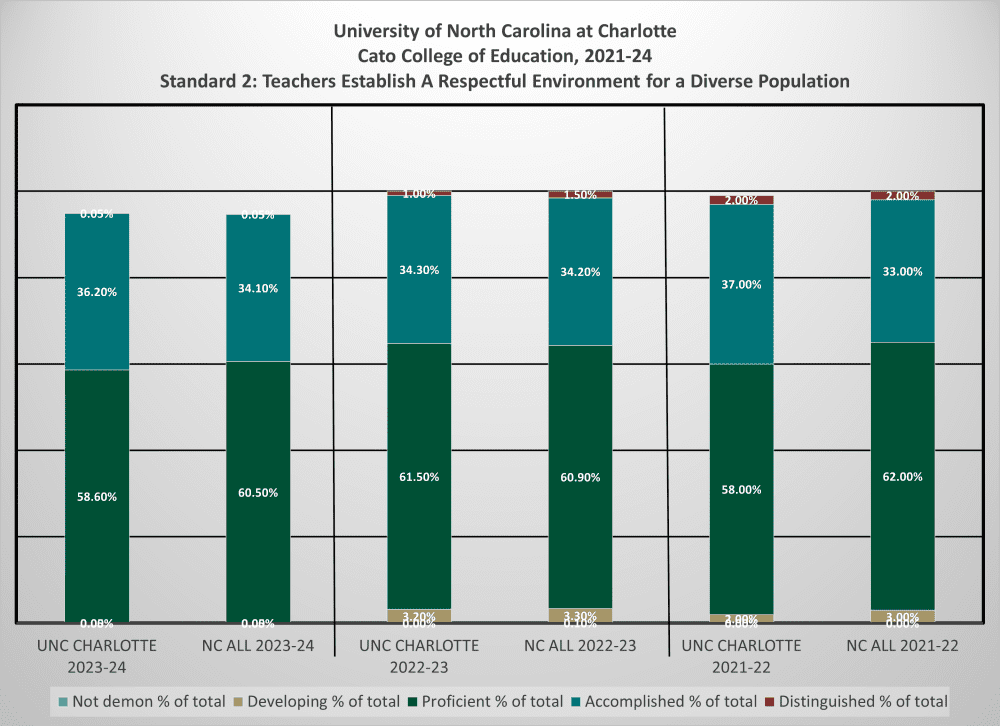
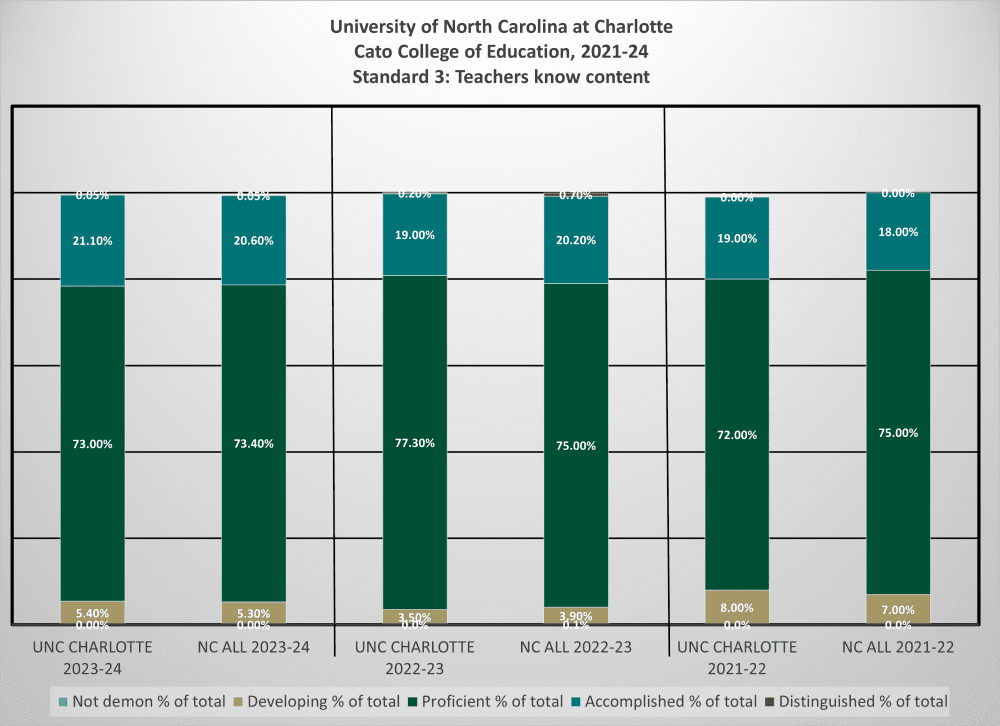
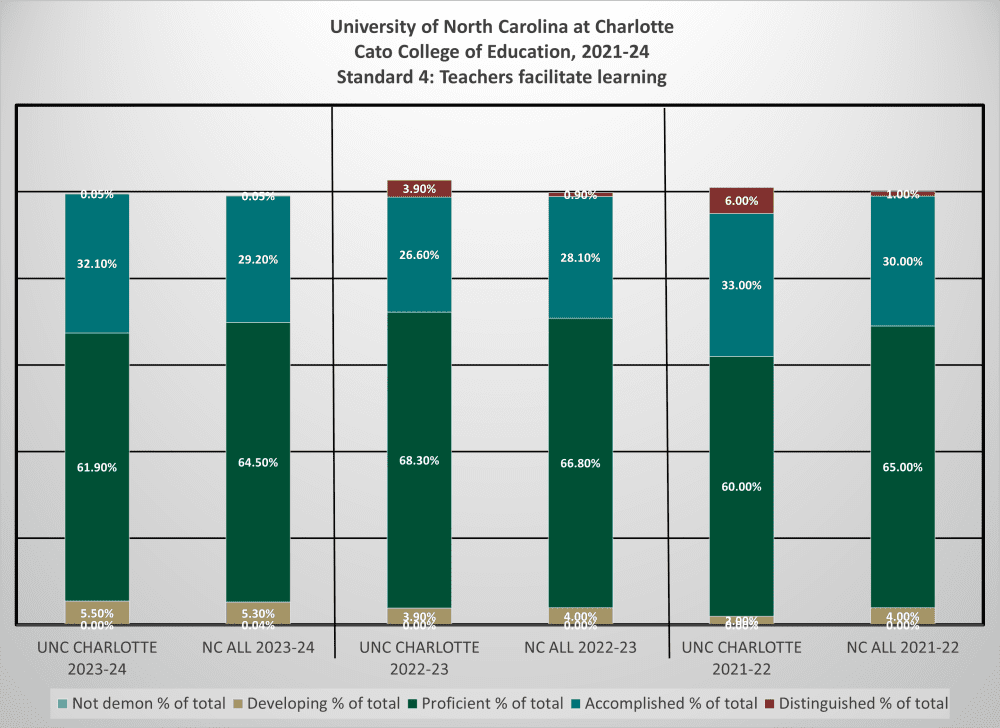
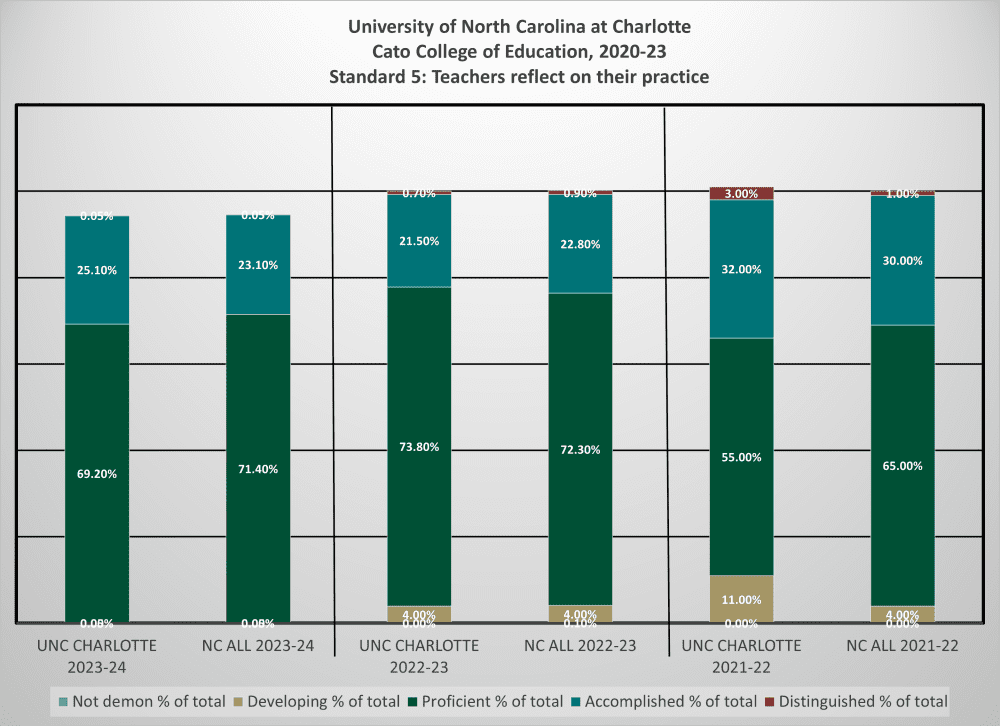
Source: NCDPI EPP Dashboard
The NC Employer Survey is administered to principals and other administrators to complete for each first-year teacher employed at their school. Administrators are asked to indicate if the first-year teacher is effective in following teaching tasks relative to other first-year teachers based on the Professional NC Teacher Standards. The tables below show the most recent data available to us. For the 2022-23 Academic Year, the categories for the response groups changed.
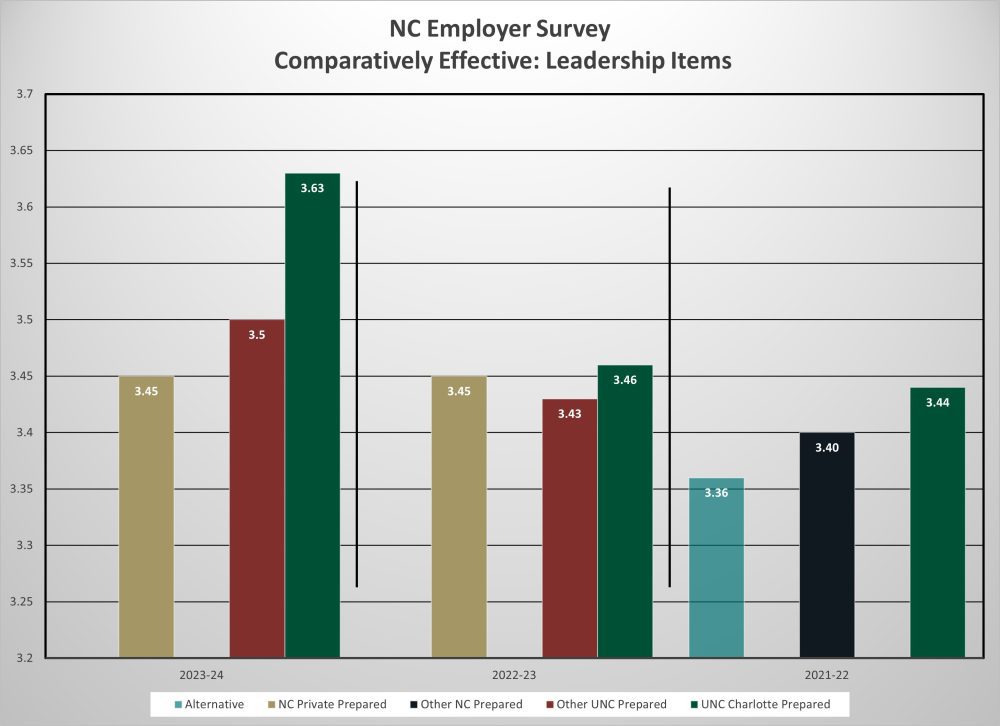
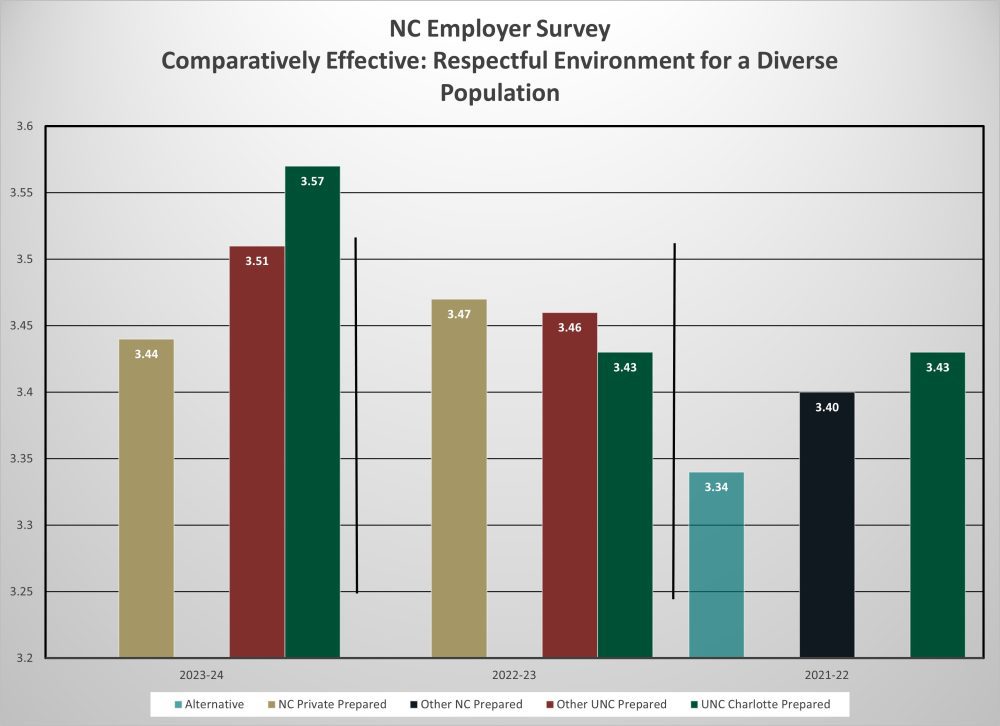
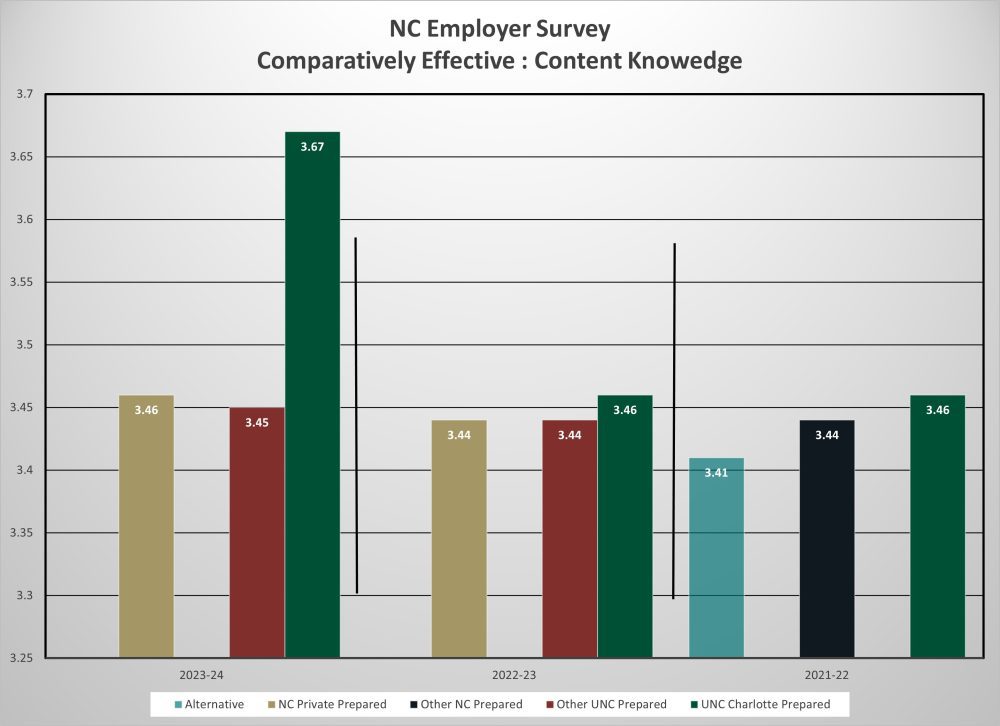
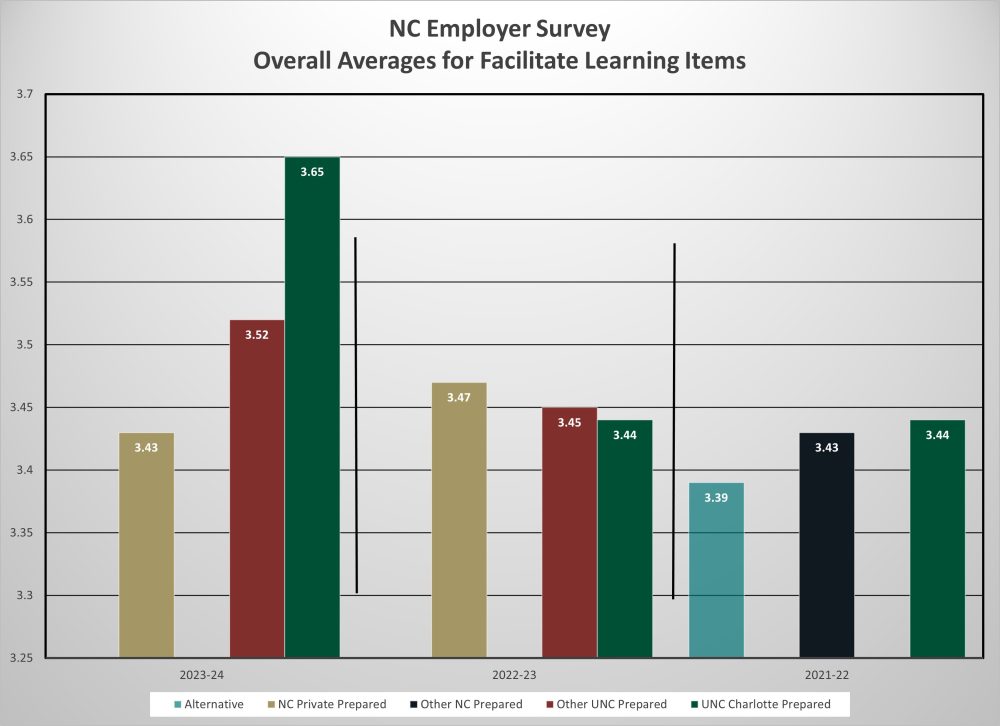
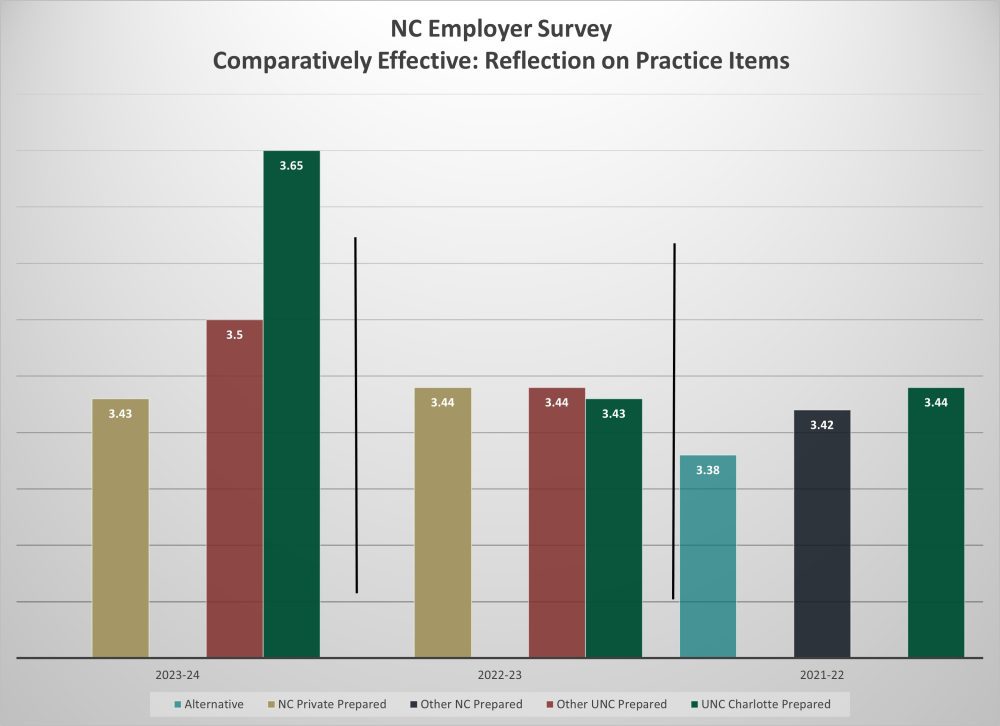
Source: NCDPI – NC Employer Survey
Educators who complete advanced (master’s) licensure programs at UNC Charlotte are expected to understand the learner and learning, their content area, instructional practice, and professional responsibility that allows them to work effectively with diverse P-12 students and their families. As part of CAEP Annual Report Measure 2: Satisfaction of employers and stakeholder involvement (Components RA 4.1, RA 5.3) for advanced programs, a survey is administered to gather responses from NC public and charter schools where two or more UNC Charlotte Cato College of Education advance program graduates are employed. This survey has not yet been validated as it is in the pilot phase. It aligns with the collective preparation of those teachers or administrators, not individuals, and includes graduates of all Master of Education, Master of School Administration, Add-on Certificates and Doctorate in Educational Leadership programs. The data tables below show aggregated results. Note: This survey was initially administered during the 2021-22 academic year and again during 2023-24. We plan to administer it every other year to ensure we are assessing employer satisfaction of unique graduates with each round of responses.


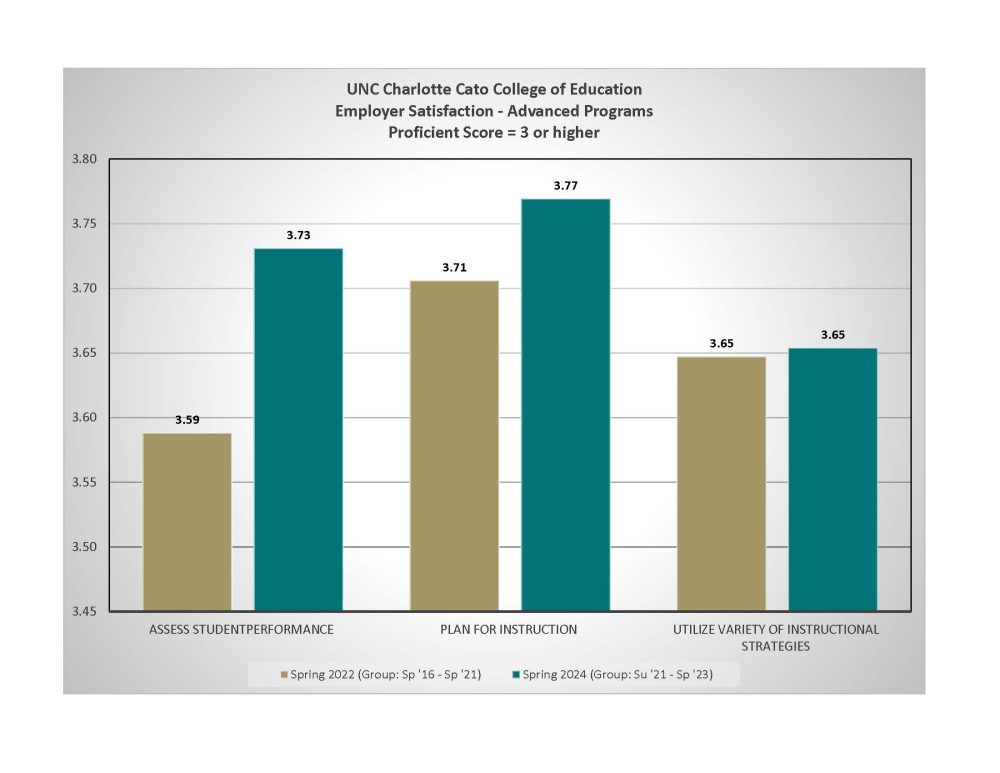
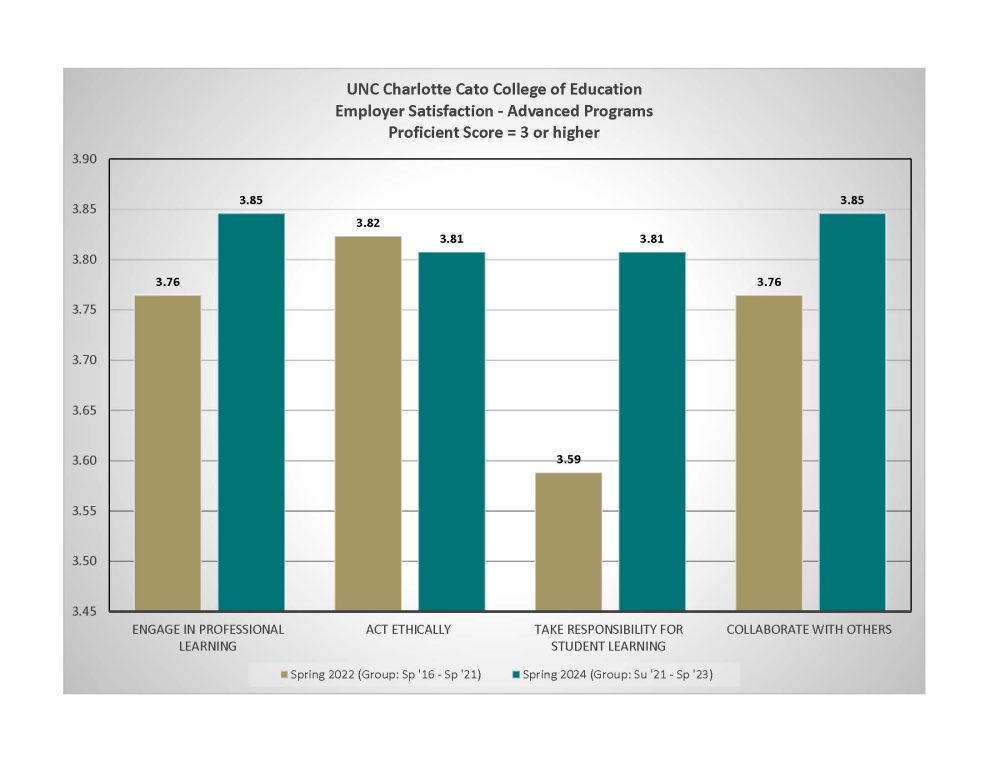
Source: UNC Charlotte Advanced Completer Survey
The data below represents the various indicators used in our initial programs to determine if UNC Charlotte candidates are prepared to enter the profession of teaching.
Licensure Exams – Title II
As part of the Higher Education Act, the Federal Title II reporting process collects data from all EPPs and state organizations to formulate one report with licensure exam pass rates for each institution compared to all test takers in the state. Teacher candidates must successfully pass one or more standardized exams within their first three years of licensure to convert their Initial Professional Educator License to a Continuing Professional Educator License. The table below shows the pass rates of UNC Charlotte candidates in comparison with the overall NC pass rates.
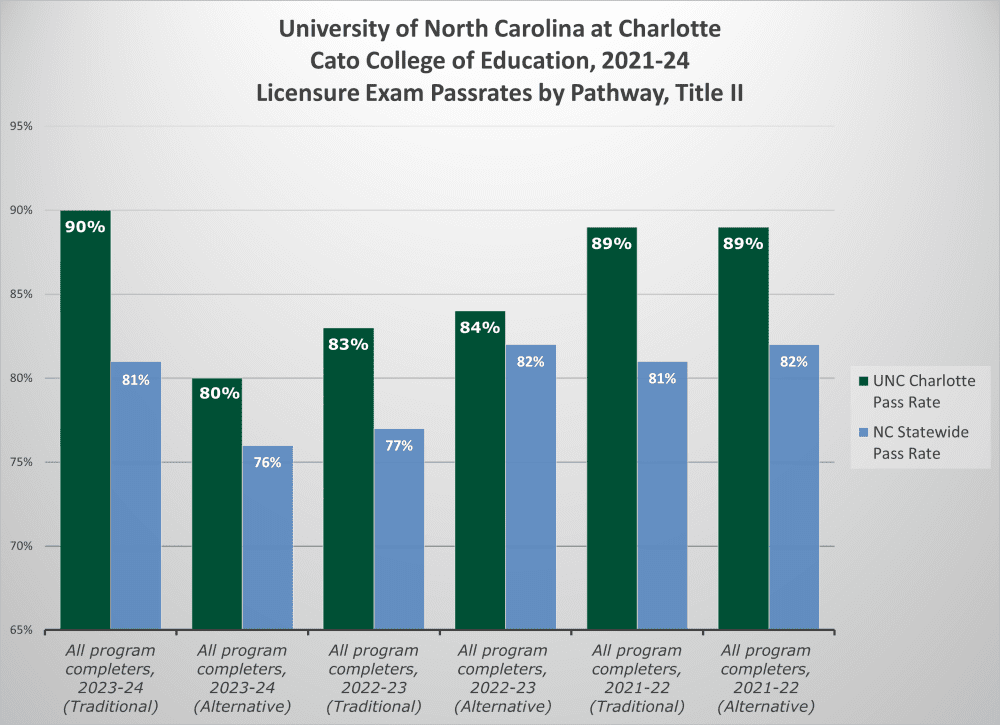
Source: Title II Report
edTPA
All candidates are required to complete the edTPA assessment for external scoring through Pearson during the full-time internship. edTPA is a pre-service assessment process designed by educators to answer the essential question: “Is a new teacher ready for the job?” edTPA includes a review of a teacher candidate’s authentic teaching materials as the culmination of a teaching and learning process that documents and demonstrates each candidate’s ability to effectively teach their subject matter to all students. Teacher candidates at UNC Charlotte complete the edTPA assessment aligned with the content area in which they are seeking licensure. Assessments vary by number of rubrics. The table below shows the overall pass rates of Charlotte candidates. *edTPA became consequential for NC licensure in fall 2019.
Source: Pearson edTPA Data Reports
Per NC State Board of Education policy, beginning September 1, 2019 (fall 2019 semester), all candidates seeking a North Carolina licensure recommendation must have an official edTPA minimal passing score:
- For 15-rubric handbooks, a score of 38
- For 13-rubric handbooks, a score of 32
- For 18-rubric handbooks, a score of 45
The data tables below show overall average total rubric scores for UNC Charlotte in comparison with all NC average total rubric scores.
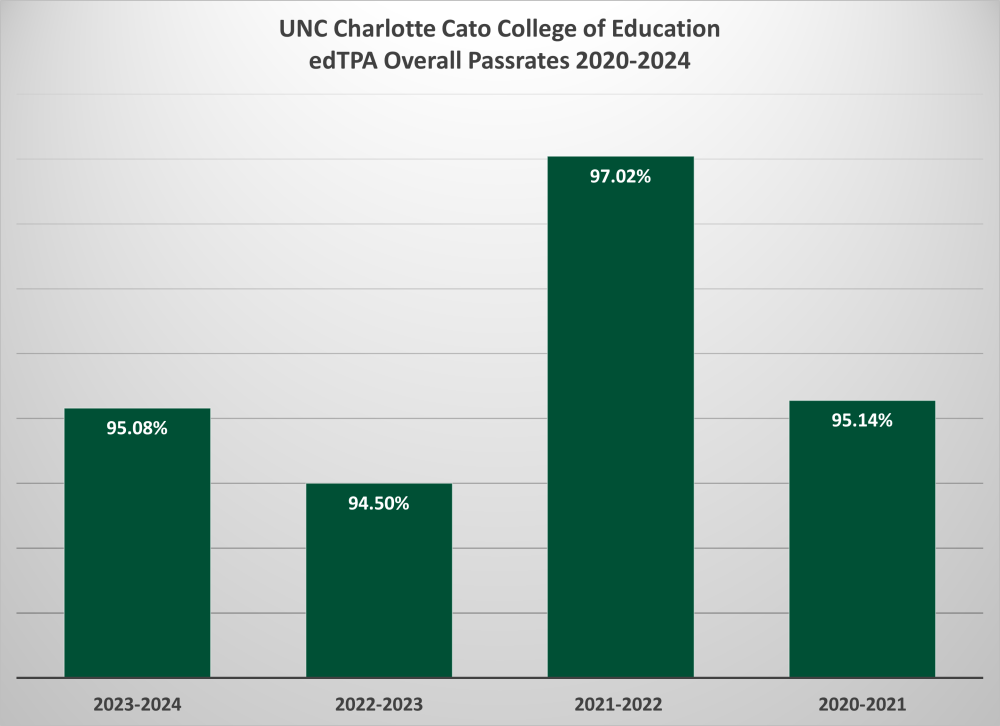
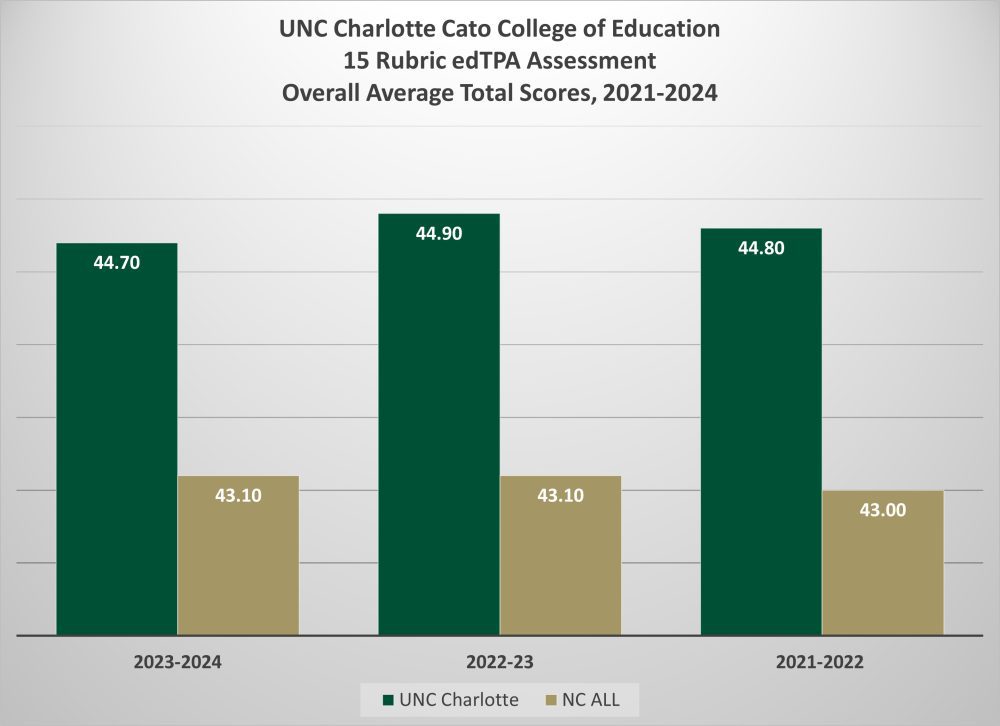
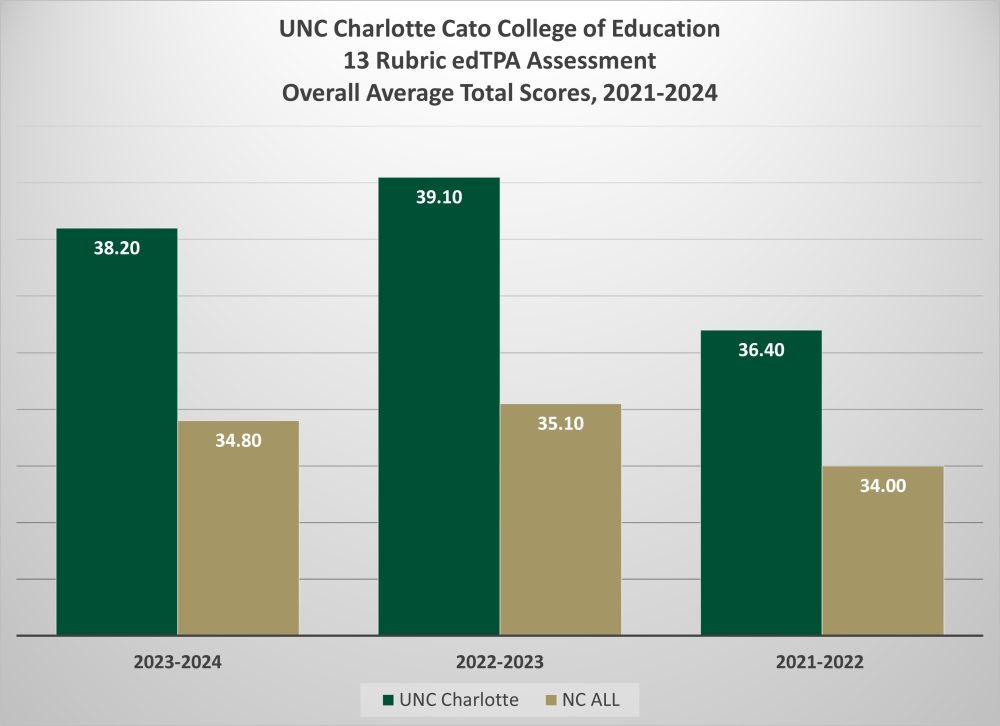
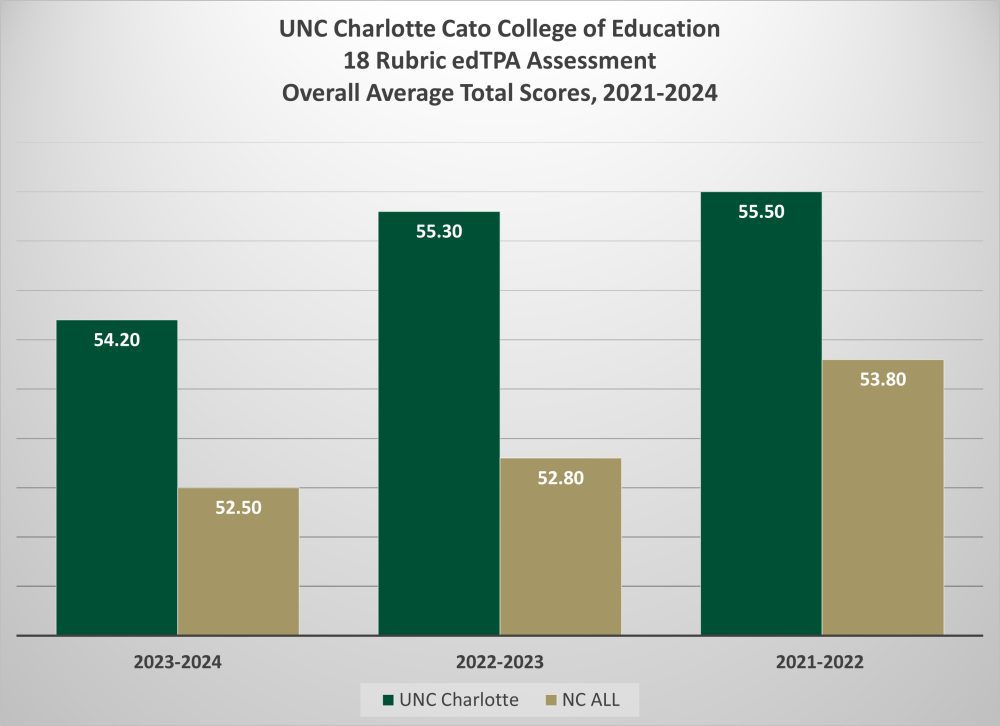
Source: Pearson edTPA Data Reports
CPAST
Beginning in fall 2020, student teaching candidates in the Cato College of Education at UNC Charlotte are assessed on the Candidate Pre-Service Assessment of Student Teaching tool (CPAST). Developed by The Ohio State University, the CPAST rubric has established validity and reliability and was specifically designed with meeting CAEP standards in mind. CPAST has 21 rubrics that cover seven domains: (1) Planning for Instruction and Assessment, (2) Instructional Delivery, (3) Assessment, (4) Analysis of Teaching, (5) Professional Commitment and Behaviors, (6) Professional Relationships, and (7) Critical Thinking and Reflective Practice. These collectively represent the content knowledge and pedagogical skills that candidates are required to demonstrate before being recommend for licensure at the end of their programs. Candidates receive evaluations at the midpoint and end of the semester. The data table below shows the midpoint and final average scores for three semester cycles collected with CPAST.
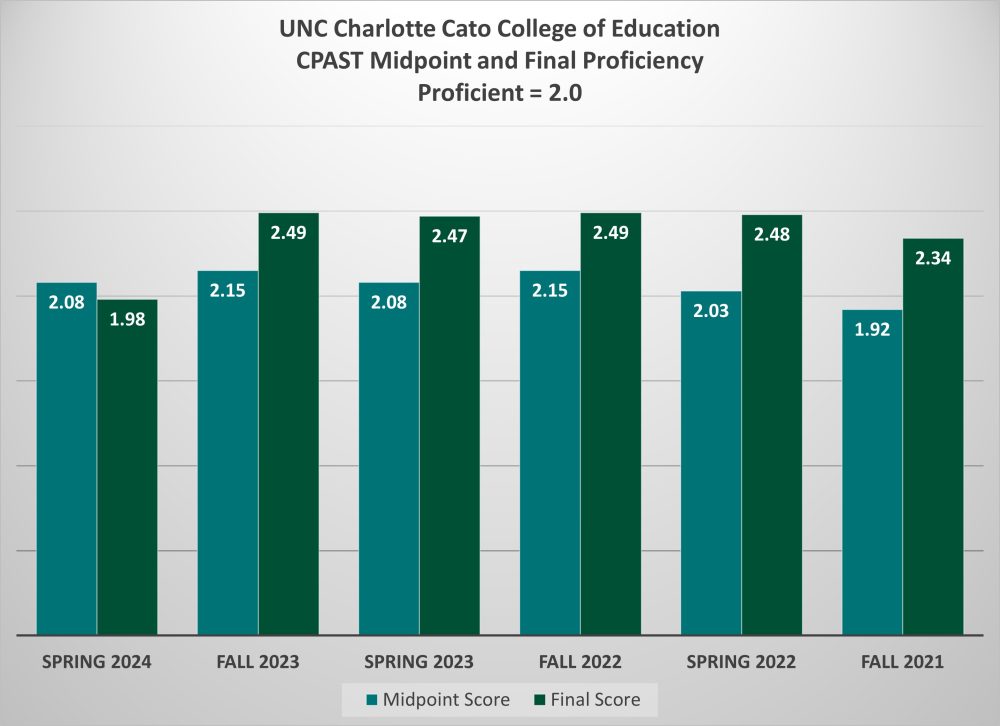
Source: COED Office of Assessment & Accreditation
The mission of the Cato College of Education is to prepare highly effective and ethical professionals whose work positively impacts the people and organizations they serve in urban, rural, and other diverse settings. In order to prepare Advanced Program completers to uphold these standards, UNC Charlotte Cato College of Education has developed an assessment of professional disposition process to evaluate, provide feedback, coach, and assess candidates at various points in the program progression. Candidates complete a dispositions self-assessment at the entry point to the program. Another dispositions self-assessment and instruction midpoint evaluation is completed by an instructor in a designated course. At the end of the program, an affirmation to uphold the professional disposition is completed by the candidate. If any concerns are identified during the courses, faculty members work with the student to identify areas of need and methods to achieve the desired outcomes and submit documentation to the COED Office of Assesment & Accreditation regarding the disposition. The data table below shows the overall proficiency of advanced program students evaluated during the midpont assessment of professional disposition. Data is collected at the end of each semester.
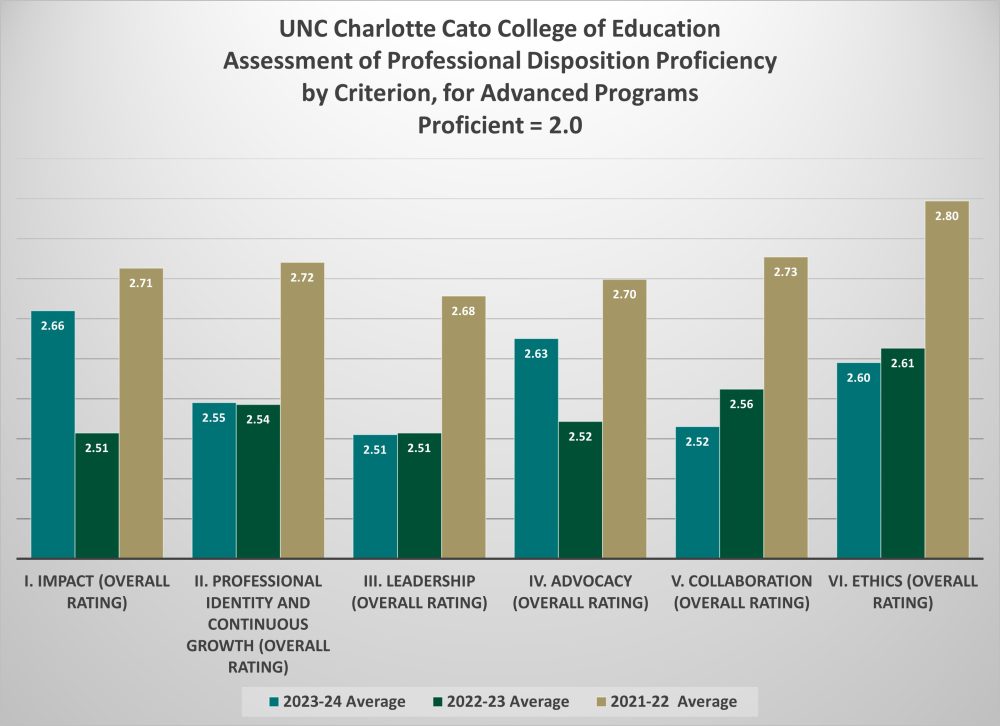
Source: COED Office of Assessment & Accreditation
All advanced program completers are eligible to apply for an advanced professional educator’s license through the North Carolina Department of Public Instruction (NCDPI). Recommendations for licensure are completed by the Office of Teacher Education Advising & Licensure (TEAL) at UNC Charlotte once a completer submits the application to NCDPI and meets all requirements for the license. Below is a data table showing the number of advanced program completers, the number of advanced licensure recommendations completed by the TEAL office, and the percentage of the advanced program completers recommended by the TEAL office. Note: While all advanced program completers who pass NCDPI-required exams (when applicable) are eligible to be recommended for an advanced license in NC, not all completers immediately apply. The data below represent only those advanced completers who applied for licensure.
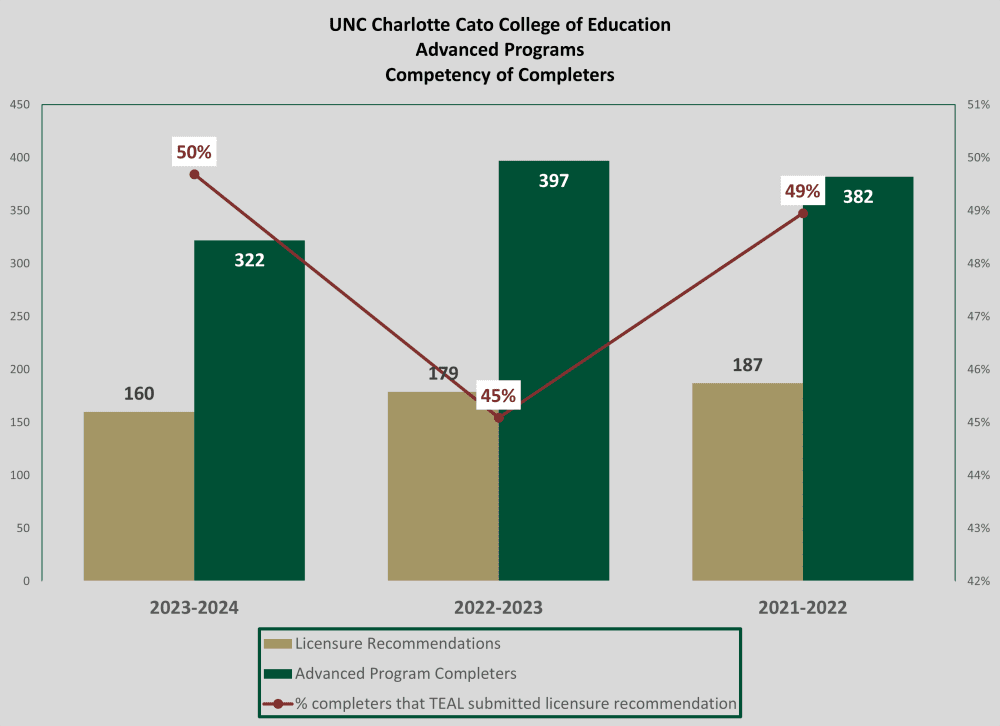
Sources: UNC Charlotte Institutional Research Census Data Files and TEAL Database
The NC Department of Instruction (NCDPI) provides UNC Charlotte with a current employment file of employees working for NC public or charter schools who have graduated from the Cato College of Education. This file is provided to the EPP in the spring of each academic year and includes all graduates from the Cato College of Education, including undergraduate, graduate certificate, master’s, and doctoral programs. Below is a visual representation of where our graduates are currently working in the NC public or charter schools as of December 2024. This data is based on the 2024-2025 employment file received from NCDPI.
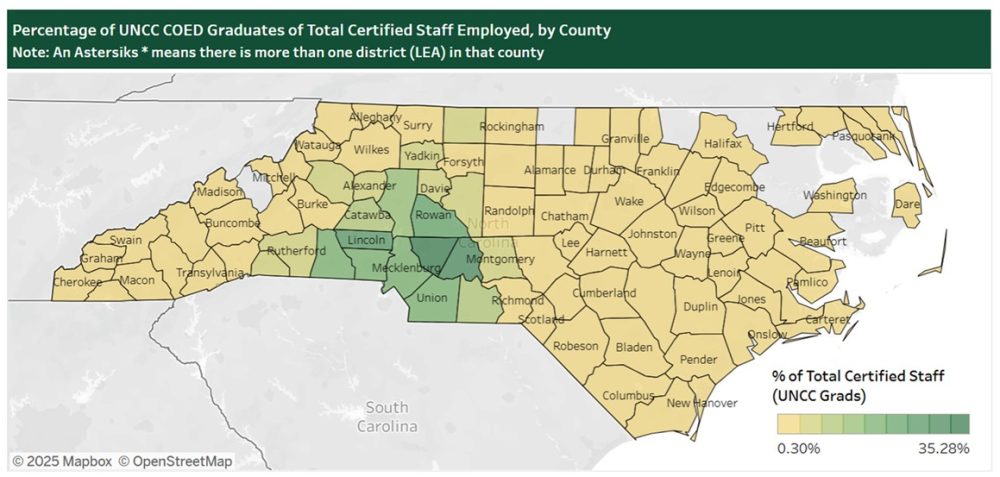
Information to Note from Map:
1. UNC Charlotte Cato College of Education graduates are employed in 91 of the 100 NC counties.
2. UNC Charlotte Cato College of Education graduates are employed in 232 of the 359 NC Public and Charter school districts
The data charts below show the percentage of initial and advanced program completers employed by NC public or charter schools the following year. The Cato College of Education does not currently have a way to track employment at private institutions, out-of-state school districts, or other sectors.
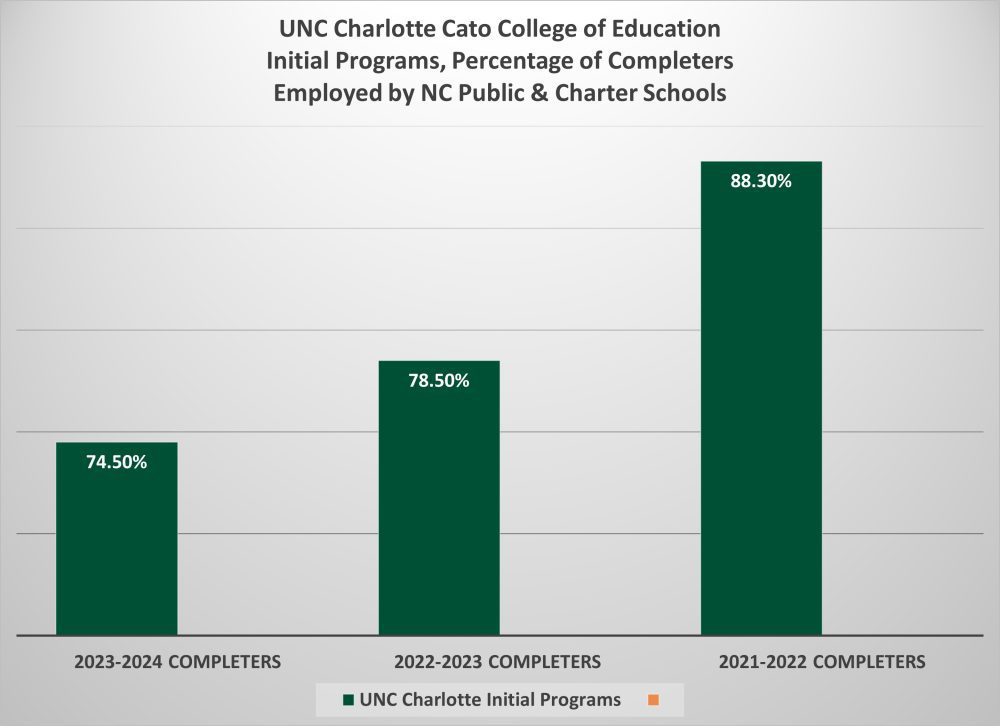
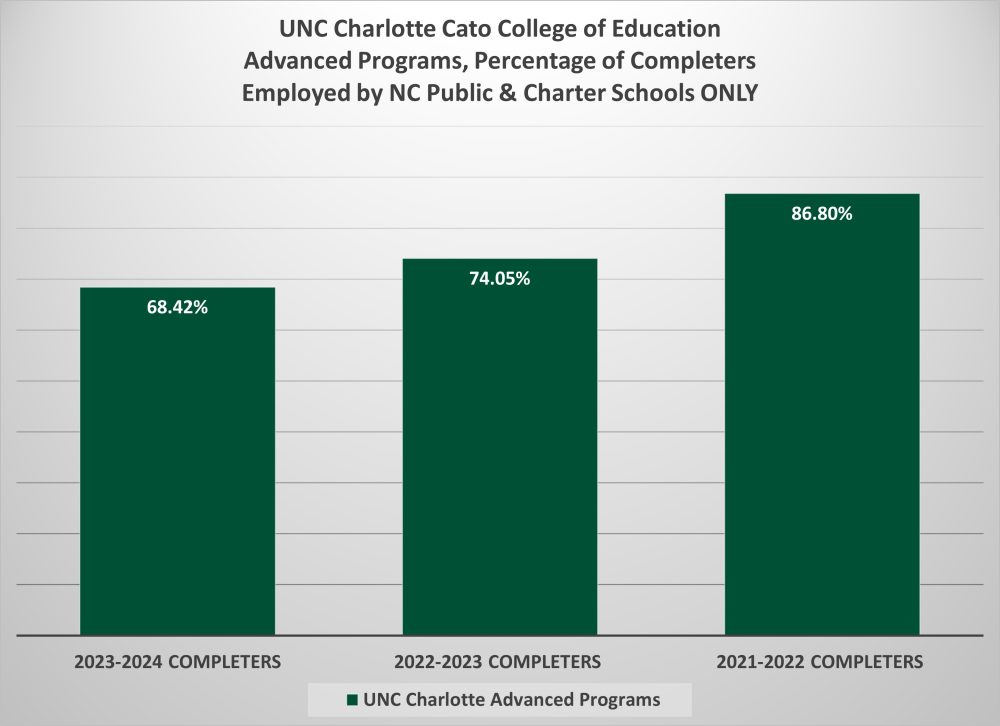
Source: NCDPI Employment File and Institutional Graduation Data